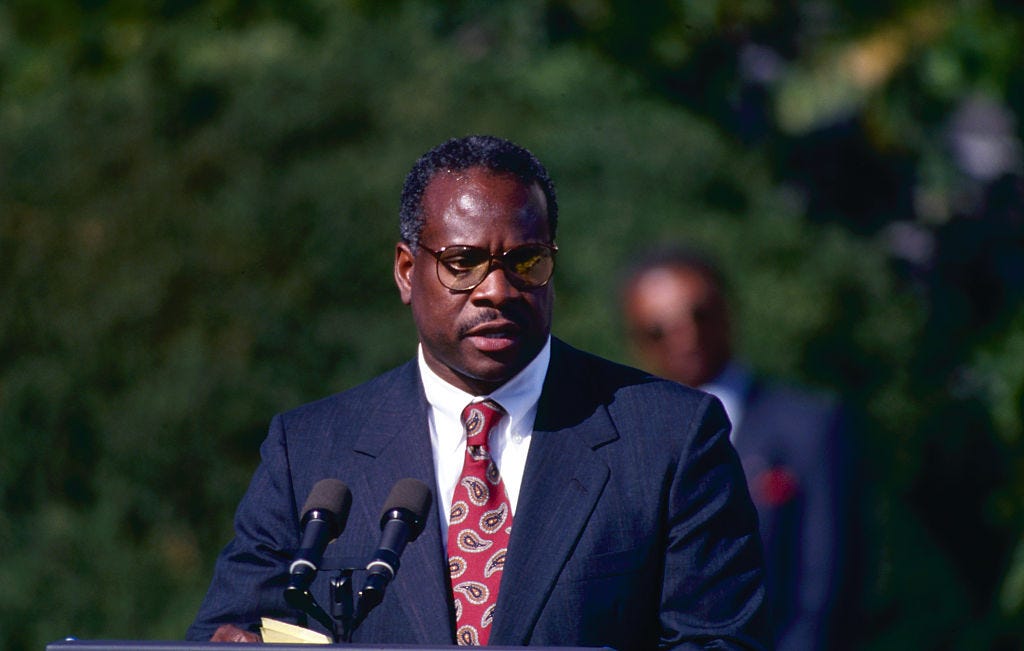- Clarence Thomas in a new book says he has "no idea why or how" he was tapped for the Supreme Court.
- He shared with "Created Equal" co-editor Michael Pack his concerns about rumors of an appointment.
- Thomas was eventually nominated by George H.W. Bush to replace the retiring Thurgood Marshall.
Clarence Thomas in a newly-released book said that he had "no idea why or how" he was nominated to the Supreme Court in 1991 as he recounted the process that set him up to become one of most consequential conservative voices on the bench.
In the book, "Created Equal: Clarence Thomas in His Own Words," co-edited by Michael Pack and Mark Paoletta, Thomas sat down with Pack for over 30 hours between November 2017 and March 2018, in what became an expanded companion to the 2020 documentary of the same name.
While speaking with Pack, Thomas revealed he was surprised when he heard that Associate Justice Thurgood Marshall, a revered civil-rights trailblazer and the first Black jurist on the high court, was stepping down from his post.
"I have no idea why or how I got nominated. All I know is that Justice Marshall retired, and that was a shock," Thomas said. "My reaction was, 'Oh no, this is going to be bad. People will go on a rumor that I'm one of the nominees.'"
Thomas — who had served as chair of the Equal Employment Opportunity Commission and at the time was a judge on the influential United States Court of Appeals for the District of Columbia Circuit — then spoke of the lead-up to his eventual nomination by then-President George H.W. Bush.
"I get a call from [White House Counsel C.] Boyden Gray the very afternoon Justice Marshall retired, saying, 'Are you ready for another walk around the park?'" Thomas said.
He continued: "He sent Mark Paoletta over to take me to the situation room at the Justice Department, and Mark parked across the street from the DC Circuit, across from where my wife worked, at the Labor Department. And we drove to the Justice Department. And that's where it started. They wanted to know who I thought my views and approach were closest to on the Court. And I said, 'Justice Scalia' and that was mostly because of his opinion in the Olson case."
In Morrison v. Olson, which was argued in 1988, the court ruled 7-1 that the Independent Counsel Act was constitutional.
In his dissent, Antonin Scalia — an adherent of originalism when he served on the court — wrote that the law should be stuck down because criminal prosecution "is an exercise of purely executive power."
Thomas then recalled how he ran into then-first lady Barbara Bush on the family's property in Kennebunkport, Maine, after being flown to the locale to speak to the president. It was soon thereafter when he found out about his nomination.
"We were walking along to the Bush's residence, and we ran into Mrs. Bush. And she said, 'Congratulations,' and then my heart sank," he said in the interview. "And she said, 'Oh I guess I let the cat out of the bag.'"
The president shortly thereafter proceeded to ask Thomas two questions about taking on the role as an Associate Justice.
"He said, 'If you get on the Supreme Court, can you call them as you see them?' I said, 'That's the only way I know how to do it,'" Thomas recalled.
He continued: "The other was, 'Can you and your family get through confirmation?' I said, 'I've been through four, and I think I can get through one more.' And then he said, 'If you go on the Court, I will never publicly criticize any opinion of yours.' And he repeated that, and then said, 'At two o'clock, I'm going to nominate you to the Supreme Court. Let's go have lunch.'"
After a contentious confirmation hearing, Thomas was eventually confirmed by the Senate later that year — and after the death of Scalia in 2016, he has become a pillar of the court's conservative wing.
